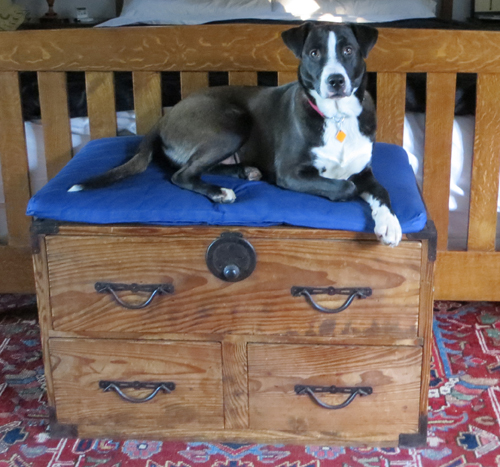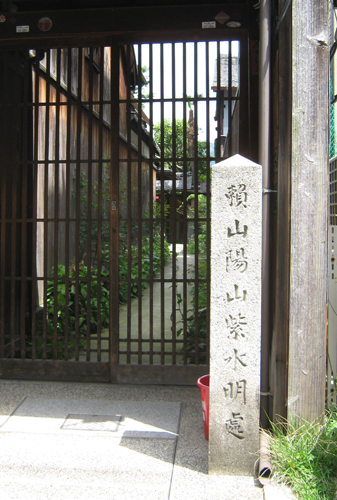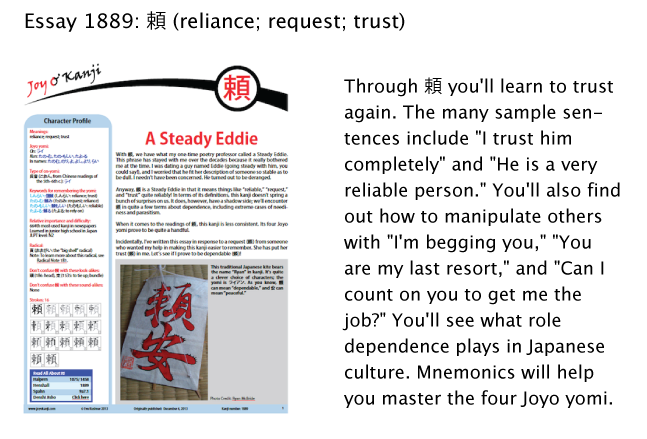Purple Mountain Majesties
Let's start with a quiz. What do you think this term could mean?
山紫水明 (さんしすいめい) mountain + purple + water + clear
a. wishful thinking; unachievable ideals
b. simplistic thinking
c. natural beauty; picturesque scenery
d. vivid perceptions after long periods of meditation and fasting
Speaking of purple things, I'll block the answer with a photo of Indigo, who has just joined my family!

Photo Credit: Eve Kushner
Much to my surprise, she hopped up on a tansu today and made herself very much at home. You can also see her in a video that someone created at the shelter. As to her name, she is a shade of faded black on the sides. The color reminds me of that distinctive Japanese gray that you just don't see anywhere else, and from there my mind moved to indigo, another incredible color that makes Japanese dyed fabrics and ukiyo-e prints unlike any other. In Japanese, indigo is 藍 (あい). And あい as 愛 also means "love"! To see the color indigo, see the first and third images in Radical Note 74.
Okay, here's the answer:
c. 山紫水明 (さんしすいめい: mountain + purple + water + clear) means "natural beauty; picturesque scenery." My proofreader tells me that every educated Japanese person uses 山紫水明 when describing scenic beauty, even though it's a sophisticated expression. "It is the right phrase to tell how beautiful nature or scenery is," he says.
For example, a website about Gifu Prefecture starts with this sentence:
山紫水明の地「岐阜」。
Gifu, a place of outstanding natural beauty.
地* (ち: place); 岐阜 (ぎふ: name of a prefecture)
Similarly, one can find these sentences online:
京都は三方が山の濃い緑に囲まれ、清流に恵まれた山紫水明の地です。
Kyoto is a land of beautiful picturesque scenery surrounded by dark green mountains in three directions and rich in clear streams.
京都 (きょうと: Kyoto); 三方 (さんぽう: three directions); 山 (やま: mountains); 濃い (こい: dark); 緑 (みどり: green); 囲む (かこむ: to surround, shown here in its passive voice); 清流 (せいりゅう: clear stream); 恵まれる (めぐまれる: to be rich in)
土地開発が進み、山紫水明の地は次第に少なくなってきている。
As rural land development progresses, scenic areas are dwindling.
土地 (とち: land); 開発 (かいはつ: development); 進む (すすむ: to progress); 次第に (しだいに: gradually); 少ない (すくない: scarce)
The “rural” part is implied; you can find 山紫水明 places only in undeveloped areas.
In Kyoto, you can see the phrase 山紫水明 on this stone marker:

Photo Credit: mariemon
The marker indicates the formal name of a hut that belonged to Rai Sanyo (頼山陽, らい さんよう, 1781–1832), a historian, Confucian scholar, poet, and writer. Here's the writing on the marker:
頼山陽山紫水明處
處 (しょ: place, a non-Joyo kanji)
He had this small thatched hut built in the garden of his Kyoto house in 1828, using the small building as his study until he died four years later.
According to one site, ever since Rai named the hut 山紫水明, the Japanese have used that term to describe places of outstanding natural beauty. Did he actually coin this term, one that seems like a yojijukugo in every respect?! Yes, Kanjigen concurs that this term originated in Japan. Unfortunately, it's tough to find an etymology; dictionaries just say “mountains glowing purple in the splendor of the sun."
As long as we're talking about highbrow literary matters, I'll mention one other one. I've recently had discussions with three proofreaders about the writer Ryunosuke Akutagawa, sheerly by coincidence. They all used "novel" for what turned out to be one-page stories. In fact, I discovered that Akutagawa is known as the father of the short story in Japan. They were surprised to hear that English speakers use "short story," "novella," and "novel," depending on the length. To the Japanese, that aspect doesn't matter at all when it comes to nomenclature. I never expected to stumble upon a cultural difference of this sort, particularly because the Japanese are so specific about other matters, as when they classify both sweets and dustrags according to the percentage of moisture they contain!
One of the Akutagawa discussions came up as I worked on essay 1889 on 頼 (reliance; request; trust), which is now out. Here's a sneak preview:

As I summarized one Akutagawa story for that essay, I was stunned to see what a powerful parable he wrote in a sole page. He presented the sort of vivid scenario that seems to explain human nature in a few deft strokes. His story will likely stay with me for life. What a find!
Have a wonderful weekend, filled with purple mountains and clear water! As for me, I'll be cleaning up after a puppy who isn't yet housebroken!

Comments